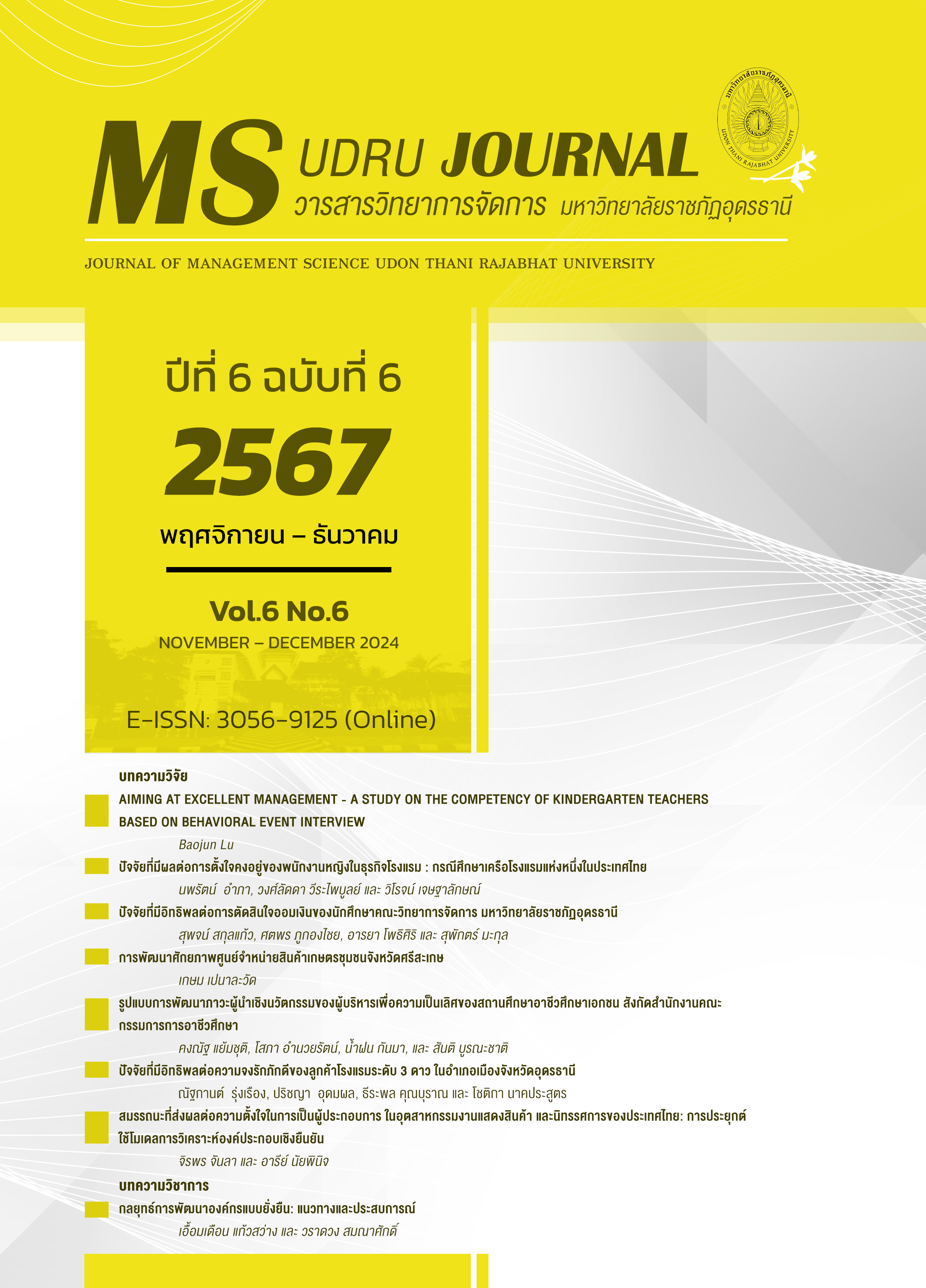FACTORS AFFECTING THE RETENTION INTENTION OF FEMALE EMPLOYEES IN HOTEL BUSINESS: A CASE STUDY OF A CHAIN HOTEL IN THAILAND
Main Article Content
Abstract
This study aims to investigate the correlation between factors influencing problem-solving abilities and workplace challenges, an organizational culture that promotes collaboration and engagement, the emphasis on women in career competition, employee career advancement, and work-family balance in relation to quality of life. We want to investigate the factors influencing the retention of female employees in the hotel business and conduct a case study on a specific hotel chain. The sample consisted of 400 female employees from the International Chain Hotel in Thailand, selected using purposive sampling. We collected data using a questionnaire, then used descriptive statistics to describe the frequency, percentage, mean, and standard deviation, followed by inferential statistics such as Pearson's correlation coefficient and multiple regression analysis to draw conclusions for this study.
The study's conclusions showed that: 1) the work challenge factors of female employees, such as support for problem-solving abilities and workplace obstacles, organizational culture that encourages teamwork and participation, emphasis on gender equality in professional competition, personnel development, and the balance of work, family, and quality of life, have a positive relationship with the retention intentions of female employees in the hotel business, and are statistically significant at the 0.05 level; 2) these factors have a significant impact on the retention intentions of female employees in the hotel business at the 0.05 level. Multiple regression analysis facilitates the creation of a linear predictive equation.
Article Details

This work is licensed under a Creative Commons Attribution-NonCommercial-NoDerivatives 4.0 International License.
บทความที่ได้รับการตีพิมพ์เป็นลิขสิทธิ์ของคณะวิทยาการจัดการ มหาวิทยาลัยราชภัฏอุดรธานี
ข้อความที่ปรากฏในบทความแต่ละเรื่องในวารสารวิชาการเล่มนี้ ไม่ใช่ความคิดเห็นและความรับผิดชอบของผู้จัดทำ บรรณาธิการ กองบรรณาธิการ และคณะวิทยาการจัดการ มหาวิทยาลัยราชภัฏอุดรธานี ความรับผิดชอบด้านเนื้อหาและการตรวจร่างบทความแต่ละเรื่องเป็นความคิดเห็นของผู้เขียนบทความแต่ละท่าน
References
กรรัช กุณรินทร์ และจิราพร ระโหฐาน. (2565). ปัจจัยที่มีผลต่อความตั้งใจคงอยู่ของข้าราชการ ตำแหน่งเสมียนตราอำเภอ สังกัดกรมการปกครอง กระทรวงมหาดไทย. วารสารวิจัยวิทยาการจัดการ มหาวิทยาลัยราชภัฏสุรินทร์, 7(1), 104-115.
คณะกรรมการเสริมสร้างความผูกพันองค์กร. (2564). สมดุลชีวิต 8 - 8 - 8 : สูตรสร้างความสุขสมดุล ให้กับชีวิตและการทำงาน (เอกสารคู่มือ). อุบลราชธานี: ศูนย์สุขภาพจิตที่ 10.
จิตรลดา ช่วงประยูร, ภาวิน ชินะโชติ และ ณัฐปภัสษ์ จุ้ยเจริญ. (2566). การจัดการทรัพยากรมนุษย์ที่มีผลต่อ การคงอยู่ของพนักงานโรงงานอุตสาหกรรมประเภทกลุ่มอุตสาหกรรมโลหะในจังหวัดสระบุรี. วารสารสุโขทัยธรรมาธิราช, 36(1).
ธนวัชฐ์ เกษศิลา ธัญนันท์ บุญอยู่ และสุมาลี รามนัฏ. (2565). อิทธิพลของความพึงพอใจในงานและความผูกพันต่อองค์กรที่อยู่ในฐานะตัวแปรคั่นกลางระหว่างการรับรู้การสนับสนุนจากองค์กรสู่ความตั้งใจคงอยู่ในงานของพนักงานในสถานประกอบกิจการเกี่ยวกับการตัดกรอผ้าใยสังเคราะห์ จังหวัดระยอง. วารสารด้านการบริหารรัฐกิจและการเมือง, 11(1), 61-76.
เธียรไชย ยักทะวงษ์ นำชัย ศุภฤกษ์ชัยสกุล และคานู ปรียา โมฮาน. (2565). การประยุกต์สมดุลชีวิตกับการทำงานสำหรับพนักงานองค์กรเอกชน. วารสารสังคมศาสตร์และมานุษยวิทยาเชิงพุทธ, 7(8), 14-27.
ภคพร กระจาดทอง. (2561). ปัจจัยที่มีอิทธิพลต่อการคงอยู่ของเชฟโรงแรมในประเทศไทย. วิทยานิพนธ์ปริญญาบริหารธุรกิจดุษฎีบัณฑิต, วิทยาลัยบริหารธุรกิจนวัตกรรมและการบัญชี มหาวิทยาลัยธุรกิจบัณฑิตย์.
อรรถพล เกิดอรุณสุขศรี. (2565). แรงจูงใจและวัฒนธรรมองค์การที่มีผลต่อความคงอยู่ในการทำงานของบุคลากร สำนักการแพทย์ กรุงเทพมหานคร. วารสารโรงพยาบาลเจริญกรุงประชารักษ์, 18(1), 36-50.
อรอนงค์ วิริยะกิจ ธัญนันท์ บุญอยู่ และสุมาลีรามนัฏ. (2565). อิทธิพลของภาวะผู้นำการเปลี่ยนแปลง การรับรู้การสนับสนุนจากองค์การที่มีอิทธิพลต่อความผูกพันและการคงอยู่ของพนักงานบริษัทผลิตบรรจุภัณฑ์โลหะในจังหวัดสมุทรปราการ. วารสารวิชาการเทคโนโลยีแห่งสุวรรณภูมิ, 8(1), 99-114.
Adam, J.S. (1965). Inequity in social exchange. Advance in Experimental and Social Psychology, 2, 267-299.
Aselage, J. & Eisenberger, R. (2013). Perceived organizational support and psychological contracts: a theoretical integration. Journal of Organizational Behavior, 24(5), 491–509.
Eisenberger, R., Huntington, R., Hutchison, S. & Sowa, D. (1986). Perceived Organizational Support. Journal of Applied Psychology, 71(3), 500-507.
Herzberg, F., Mausner, B., & Syndermn, B. B. (1959). The motivation to work (2nd ed.). New York: Wiley & Son.
Hofstede G. (1991). Cultures and organizations - software of the mind. New York: McGraw Hill.
Hyman, J. & Summers, J. (2004). Lacking balance? Work-life employment practices in the modern economy. Personnel Review, 33(4), 418-429.
Mathis, R. L. & J. H. Jackson. (2011). Human Resource Management (13th ed). USA: South-Western Cengage Learning.
Rosenstock, M. I., Strecher, V. J., & Becker, M. H. (1988). Social learning theory and health belief model. Health Education Quarterly, 15(2), 75-138.


